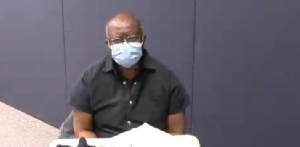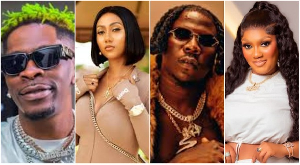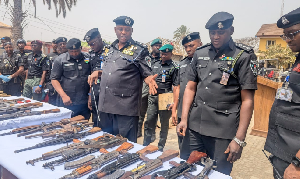By Kwame Okoampa-Ahoofe, Jr., Ph.D.
I read with quite a bit of amusement, former President Jerry John Rawlings’ allegation that the Kufuor-led New Patriotic Party (NPP) government maintained one individual journalist on a whopping monthly salary of $10,000 (Ten-Thousand Dollars), while he, Mr. Rawlings, was paid a piddling monthly salary of $350 (Three-Hundred And Fifty Dollars) a month (See “Kufuor Hits Back at JJ: He Lied Over $10K ‘Soli’ for Journalist” Peacefmonline.com 9/20/10; also, “JJ Is Right…. Some Journalists Were on National Security Payroll Under Kufuor’s Era – Alhaji Bature” Peacefmonline.com 9/20/10).
It is rather amusing because it is extremely difficult to take any allegation involving Mr. Rawlings and Ghanaian journalists at face value, knowing that Ghana’s longest-serving dictator had absolutely no respect for media practitioners except, of course, those who blindly march according to his kettle-drums. And as was to be logically expected, the office of former President Kufuor promptly and vehemently denied the aforesaid allegation.
But that Mr. Rawlings made the allegation attributed to the retired Ghanaian strongman before the august assembly of the World Congress of the Catholic Union of the Press (CUP) in Ouagadougou, Burkina Faso, was all the more ironic. And it is not clear whether the man who dominated Ghana’s political landscape for some twenty years, meant by his negative reference to the country’s media under President Kufuor’s tenure to obliquely and/or implicitly justify his unprecedented repression of the same.
In other words, what made Mr. Rawlings rather arrogantly convince himself that he deserved to be paid much, much higher than the anonymous journalist who was allegedly being paid nearly thirty times than the retired dictator? For starters, we are also told that, indeed, then-sitting President Kufuor was receiving the same salary as the retired President Rawlings. Secondly, we also do not know the professional caliber of the unnamed journalist whose existence, by the way, Mr. Kufuor has vehemently denied. In other words, our limpid contention here is that the mere fact of one’s being a journalist does not necessarily mean that any former president, or even a sitting president, ought to earn a higher monthly salary than just about any pressman or woman. Maybe the former Ghanaian toughie ought to be apprised of the fact that even here in the United States, for example, there are, indeed, media operatives who make higher salaries than President Barack Obama.
The next level of Mr. Rawlings’ complaint, of course, is that such a relatively humongous monetary sum was being directly paid the unnamed media operative by the Kufuor government as a brazen inducement to compromise the moral and professional integrity of the journalist, and thus the entire Ghanaian media landscape. This is obviously a forensically unsustainable allegation; unless, of course, any Rawlings partisan or media expert can provably point out that under Mr. Kufuor’s tenure, Ghanaian journalists, to a practitioner, played fast and loose with factual events and political issues more than happened to have been the case with Mr. Rawlings’s government. And that perforce, and significantly, such relative geniality towards the Kufuor administration had far more to do with the bribery and corruption of media operatives, rather than the relatively far more politically and professionally conducive climate created by the Kufuor-led government of the New Patriotic Party.
And on the preceding score must also be factored in the fact that, indeed, it was the Kufuor government that progressively broke down the systematically erected primitive culture of silence, by causing the enactment of the landmark Repeal of the Criminal Libel Law/Code, which had been used since the British colonial era to muzzle speech envisaged to be at cross-purposes with public policy and good governance, as the British colonial regime, as well as successive African governments, envisaged itself.
On a balance, there is absolutely no evidence indicating that, indeed, under former President Kufuor’s watch the national media, both public and private, had been in anyway remarkably compromised. To be certain, the period spanning from 2000 to 2008 unarguably constitutes the most robust season in the historical practice of modern Ghanaian journalism. The same could hardly be said about the period ranging between December 31, 1981 and December 31, 2000. And so one is left wondering whether other than extremely loving to hear himself wax with a vacuous sense of self-righteousness, Mr. Rawlings really had any legitimate axe to grind with the culture and conduct of the Kufuor-led New Patriotic Party government. It is also interesting to hear Alhaji Iddrisu Bature, the quite notorious National Democratic Congress media activist and newspaper publisher, accuse both the NDC and the NPP of being equally guilty of attempting to influence some media operatives.
*Kwame Okoampa-Ahoofe, Jr., Ph.D., is Associate Professor of English, Journalism and Creative Writing at Nassau Community College of the State University of New York, Garden City. He is Director of The Sintim-Aboagye Center for Politics and Culture and author of “The Obama Serenades” (Lulu.com, 2011). E-mail: okoampaahoofe@optimum.net.
###
Opinions of Friday, 4 November 2011
Columnist: Okoampa-Ahoofe, Kwame














